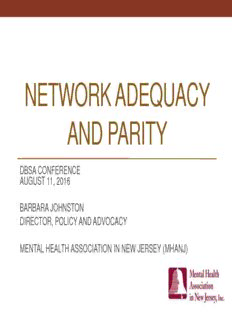
network adequacy and parity PDF
Preview network adequacy and parity
NETWORK ADEQUACY AND PARITY DBSA CONFERENCE AUGUST 11, 2016 BARBARA JOHNSTON DIRECTOR, POLICY AND ADVOCACY MENTAL HEALTH ASSOCIATION IN NEW JERSEY (MHANJ) The Mental Health Association in New Jersey, Inc. The Mental Health Association in New Jersey • (MHANJ) is a statewide private, non-profit organization dedicated to improving access to treatment and opportunities for children and adults with mental illness. Through legislative and executive advocacy, our organization works with and for consumers and families to create a better life for those with mental illness. Background • MHANJ identified a need to assess the availability of psychiatric care through managed care networks, based on reports from consumers about the difficulty in finding a psychiatrist. • Through our statewide helpline, we identified long waits in getting psychiatric appointments in the public sector; wait times for appointments were often as long as three to six months. • Through our advocacy work we have found increasing consumer reports of difficulty in finding psychiatrists accepting private insurance. • MHANJ looked at managed care networks, because they are the model used by most private insurance plans. Rationale Research shows there is a “serious public health problem of access to psychiatric care in privately managed insurance plans…” due to factors including shrinking psychiatrist workforce numbers, declining fees and an increasing administrative burden (Wilk, et. al., Psychiatric Services, April, 2005). Rationale A previous study of two New Jersey counties found that only 50% of network providers were accepting new patients. The study also determined that “phantom networks have effects on managed care patients in terms of time necessary to see a clinician…” (Holstein & Paul, Hospital Topics, March, 2012). Network Adequacy Regulations • In New Jersey, licensed Health Maintenance Organizations (HMOs) must maintain adequate network capacity. • The HMO regulations require “there shall be a sufficient number of licensed medical specialists available to HMO members to provide medically necessary specialty care. • The HMO shall have a policy insuring access to specialists [including psychiatrists] within 45 miles or one hour driving time, whichever is less). • Advocate for: the provider’s office is located greater than 25 miles or 30 minutes average driving time or public transit (if available). MHANJ Managed Care Network Adequacy Study Participating/preferred provider organizations (PPOs) were selected as a focus for the study since PPOs are the insurance type that covers the majority of private insurance. MHANJ Managed Care Network Adequacy Study This study was designed to explore access to psychiatric care in NJ for privately insured patients. The objectives were to assess: • Accuracy of published provider lists • Acceptance of new patients by providers • Wait times for appointments Methodology & Design Methodology & Design Study team: • • trained interviewer • health policy intern • policy consultant • consumer • study director/advocate • psychiatrist consultant • market research/data expert • MHANJ management team
Description: